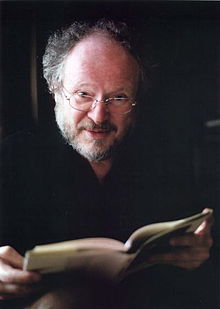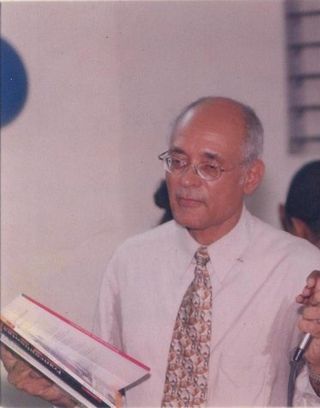
Henri Wittmann (born 1937) is a Canadian linguist from Quebec. He is best known for his work on Quebec French.

Henri Wittmann (born 1937) is a Canadian linguist from Quebec. He is best known for his work on Quebec French.
Henri (Hirsch) Wittmann was born in Alsace in 1937. [1] After studying with André Martinet at the Sorbonne, he moved to North America and taught successively at the University of Colorado at Boulder, the University of Alberta in Edmonton, the University of Windsor and McGill University in Montreal before teaching in the French university system of Quebec, the Université du Québec à Trois-Rivières and at Rimouski as well as the Université de Sherbrooke. He retired from teaching in 1997, after an extensive tour of teaching and conferencing in France. In the following years, he became the first Director of the Presses universitaires de Trois-Rivières and emeritus researcher at the Centre d’Analyse des Littératures Francophones des Amériques (CALIFA) at Carleton University in Ottawa.
As a comparatist, Wittmann contributed to the study of the morphology of a number of languages and language families: Pre-Indo-European, Indo-European (Hittite, Italic, Romance, Germanic, Creole), Afro-Asiatic (Egyptian), African (Mande, Kwa, Bantu), Austronesian (Malagasy, Polynesian), Amerindian (Arawakan, Cariban). His work between 1963 and 2002 includes more than 140 items.
He is a life member since 1962 of the Linguistic Society of America (LSA). [2] In 1965, he cofounded with André Rigault and Douglas Ellis the Linguistics Department at McGill University. In 1981, he was the cofounder, with Normand Beauchemin and Robert Fournier, of the Linguistic Society of Quebec (Association québécoise de linguistique) which he served for 10 years as president, secretary general and organizer of the annual meeting. In 1981 as well, he became the first Editor of the Revue québécoise de linguistique théorique et appliquée, a responsibility he assumed for the following 20 years.
Politically, Wittmann is known for his anarcho-syndicalist sympathies with strong links to the CNTU (Confederation of National Trade Unions), communautary and anti-war movements. In 1974-1978, he was at the center of a union conflict at the University of Quebec which changed the landscape of collective bargaining in the academic world. A specialist of the linguistic heritage of Quebec, he also is a stout defender of Quebec independence. [3]
Henri Wittmann is the first modern linguist to study non-standard forms of Quebec French (notably Joual, Magoua and Chaouin) in a theory-orientated and comparative framework.
In a general way, Wittmann, a student of André Martinet in the fifties, [4] has been the first to apply the latter's principles of chain reactions in phonology to inflectional morphology. In Wittmann's view, the basic structure of the sentence is held together by functional items, with the lexical items filling in the blanks.
Joual is an accepted name for the linguistic features of Quebec French that are associated with the French-speaking working class in Montreal which has become a symbol of national identity for some. Joual has historically been stigmatized by some, and celebrated by others. While Joual is often considered a sociolect of the Québécois working class, many feel that perception is outdated, with Joual becoming increasingly present in the arts.

A creole language, or simply creole, is a stable natural language that develops from the process of different languages simplifying and mixing into a new form, and then that form expanding and elaborating into a full-fledged language with native speakers, all within a fairly brief period of time. While the concept is similar to that of a mixed or hybrid language, creoles are often characterized by a tendency to systematize their inherited grammar. Like any language, creoles are characterized by a consistent system of grammar, possess large stable vocabularies, and are acquired by children as their native language. These three features distinguish a creole language from a pidgin. Creolistics, or creology, is the study of creole languages and, as such, is a subfield of linguistics. Someone who engages in this study is called a creolist.

Quebec French, also known as Québécois French, is the predominant variety of the French language spoken in Canada. It is the dominant language of the province of Quebec, used in everyday communication, in education, the media, and government.
Quebec French is different in pronunciation and vocabulary to the French of Europe and that of France's Second Empire colonies in Africa and Asia.
In linguistics, relexification is a mechanism of language change by which one language changes much or all of its lexicon, including basic vocabulary, with the lexicon of another language, without drastically changing the relexified language's grammar. The term is principally used to describe pidgins, creoles, and mixed languages.

A French creole, or French-based creole language, is a creole for which French is the lexifier. Most often this lexifier is not modern French but rather a 17th- or 18th-century koiné of French from Paris, the French Atlantic harbors, and the nascent French colonies. This article also contains information on French pidgin languages, contact languages that lack native speakers.

Guy Bertrand is a Canadian linguist and broadcast personality.
Canadian French is the French language as it is spoken in Canada. It includes multiple varieties, the most prominent of which is Québécois. Formerly Canadian French referred solely to Quebec French and the closely related varieties of Ontario (Franco-Ontarian) and Western Canada—in contrast with Acadian French, which is spoken by Acadians in New Brunswick and some areas of Nova Scotia, Prince Edward Island and Newfoundland & Labrador.
Magoua is a particular dialect of basilectal Quebec French spoken in the Trois-Rivières area, between Trois-Rivières and Maskinongé. Long before a military fort was constructed there, Trois-Rivières became in 1615 the first stronghold of the coureurs des bois outside the city of Québec. Magoua is the ethnonym applied to their descendants in the area. Magoua is the most conservative of all Quebec French varieties, including Joual. It preserves the sontaient ("étaient") characteristic of Métis French and Cajun French, has a creole-like past tense particle tà and has old present-tense contraction of a former verb "to be" that behave in the same manner as subject clitics.
The Association québécoise de linguistique is an academic organization devoted to the scientific study of human language, and is a professional society for Francophone linguistic researchers in North America and beyond.
Narreme is the basic unit of narrative structure. According to Helmut Bonheim (2000), the concept of narreme was developed three decades earlier by Eugene Dorfman and expanded by Henri Wittmann, The narreme is to narratology what the sememe is to semantics, the morpheme is to morphology and the phoneme to phonology. The narreme, however, has yet to be persuasively defined in practice. In interpretative narratology constrained in a framework of principles and parameters, narration is the projection of a narreme N0, the abstract head of a narrative macrostructure where Nn dominates immediately Nn-1 (Wittmann 1995).
Métis French is one of the traditional languages of the Métis people along with Michif and Bungi, and is the French-dialect source of Michif.
Bourbonnais Creole is the group of French-based creole languages spoken in the western Indian Ocean. The close relation of the languages is from the similar historical and cultural backgrounds of the islands. The name is derived from the former name of Réunion Island: Bourbon Island before 1793. Another name is Mascarene Creole, as the predominant island group is called the Mascarenes.
Saint-Barthélemy French or St. Barts patois is the dialect of French spoken in the Caribbean, on the French-controlled island of Saint-Barthélemy and by a small emigrant community on Saint Thomas in the US Virgin Islands.
Armenian Sign Language is the deaf sign language of Armenia.
The German Sign Language family is a small language family of sign languages, including German Sign Language, Polish Sign Language and probably Israeli Sign Language. The latter also had influence from Austrian Sign Language, which is unrelated, and the parentage is not entirely clear.
Bulgarian Sign Language is the language, or perhaps languages, of the deaf community in Bulgaria.
Robert Chaudenson was a French linguist.

Mauritian Creole or Morisien is a French-based creole language spoken in Mauritius. English words are included in the standardized version of the language. In addition, the slaves and indentured servants from cultures in Africa and Asia left a diverse legacy of language in the country. The words spoken by these groups are also incorporated into contemporary Morisien.

Pierre Vernet was a Haitian linguist and lexicographer, who created the Center for Applied Linguistics in Port-au-Prince. He was instrumental in standardizing Haitian Creole (Krèyol) spelling as an aid to literacy, and the elaboration of French-Krèyol lexicons of terminology. He also published dictionaries with Alain Bentolila and with Bryant Freeman.